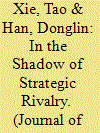|
|
|
Sort Order |
|
|
|
Items / Page
|
|
|
|
|
|
|
| Srl | Item |
| 1 |
ID:
096589


|
|
|
|
|
| Publication |
2010.
|
| Summary/Abstract |
Since the late 19th century many Chinese leaders have studied abroad, mostly in Japan, the US or the former Soviet Union. Recently, thousands are returning from studying overseas. Is this new cohort of returnees more internationalist than Chinese who do not study abroad? If their values differ and they join China's elite, they could influence China's foreign policy. Drawing on surveys of returnees from Japan and Canada over the past 15 years, we compare their views on "co-operative internationalism" and "assertive nationalism" with the attitudes of China's middle class drawn from a nationwide survey in 2006. Our returnees are both more "internationalist" than the middle class and less nationalistic. So they are likely to support China's increasing international role and perhaps constrain China's growing nationalist sentiment.
|
|
|
|
|
|
|
|
|
|
|
|
|
|
|
|
| 2 |
ID:
169113


|
|
|
|
|
| Summary/Abstract |
While much has been written about US–China strategic rivalry, no study to the authors’ knowledge has conducted an empirical analysis of this rivalry. This article fills this gap by investigating whether and how this rivalry affects a country’s response to the Asian Infrastructure Investment Bank (AIIB). The findings of this article indicate that certain aspects of bilateral strategic ties indeed have strong effects on a country’s reaction to the Chinese bank. More specifically, shorter distance to higher a level of partnership with, and more arms purchase from Beijing lead to faster accession to the AIIB, while the shorter distance to Washington results in slower accession, controlling for other factors. In addition, economically developed countries appear to be consistently more eager to join the Beijing-led bank than economically underdeveloped countries.
|
|
|
|
|
|
|
|
|
|
|
|
|
|
|
|
| 3 |
ID:
124168


|
|
|
|
|
| Publication |
2013.
|
| Summary/Abstract |
This paper will study one of the unique population movements in modern history: the circular movement of students and trainees between China and the Soviet Union from 1950 to 1966. This population movement includes more than 38,000 Chinese who were trained by the leading Soviet Union industrial enterprises, research centers and institutions of higher learning. These returned students and trainees from the Soviet Union captured a considerable number of prominent positions in the Chinese leadership from the 1980s to the 1990s. The explanation of their political impact relies on the domestic country's politics and international context.
|
|
|
|
|
|
|
|
|
|
|
|
|
|
|
|
| 4 |
ID:
174853


|
|
|
|
|
| Summary/Abstract |
This article empirically examines various factors affecting the formation of China’s bilateral investment treaties (BITs) since 1978. Using a panel data analysis, this article finds that domestic and foreign relationship as well as foreign country and global factors, help explain the signing of BITs. Specifically, China’s trade openness and economic growth, foreign countries’ level of democracy, and socialization are positively related to the signing of BITs, while foreign economic growth and the distance between two countries are negatively related to the signing of BITs. Generally, this article finds that China signs BITs mainly to attract foreign capital, signaling to foreign investors that it protects their rights in China. Meanwhile, China has been less likely to sign BITs with countries with which it enjoys favorable bargaining position. As this article finds, China is more likely to sign BITs with democratic countries, suggesting that global spread of democracy spread globalization.
|
|
|
|
|
|
|
|
|
|
|
|
|
|
|
|
|
|
|
|
|